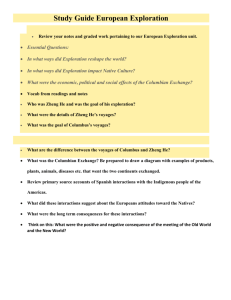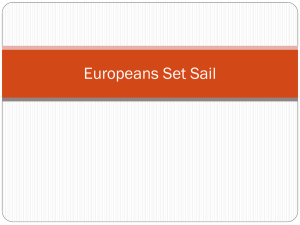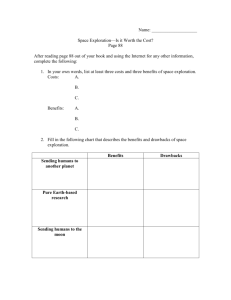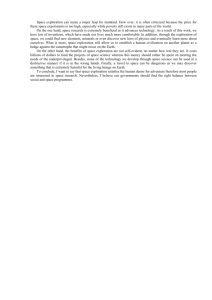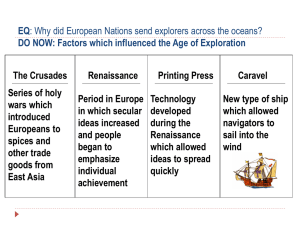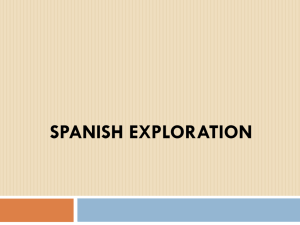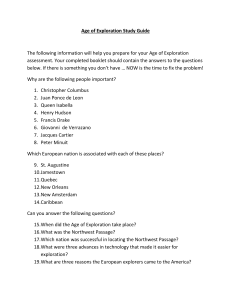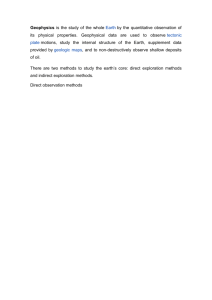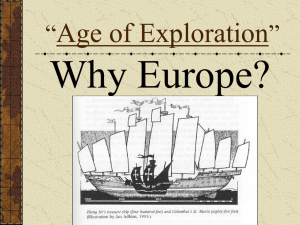Age of Exploration Document Centers ANSWER KEY (1)
advertisement
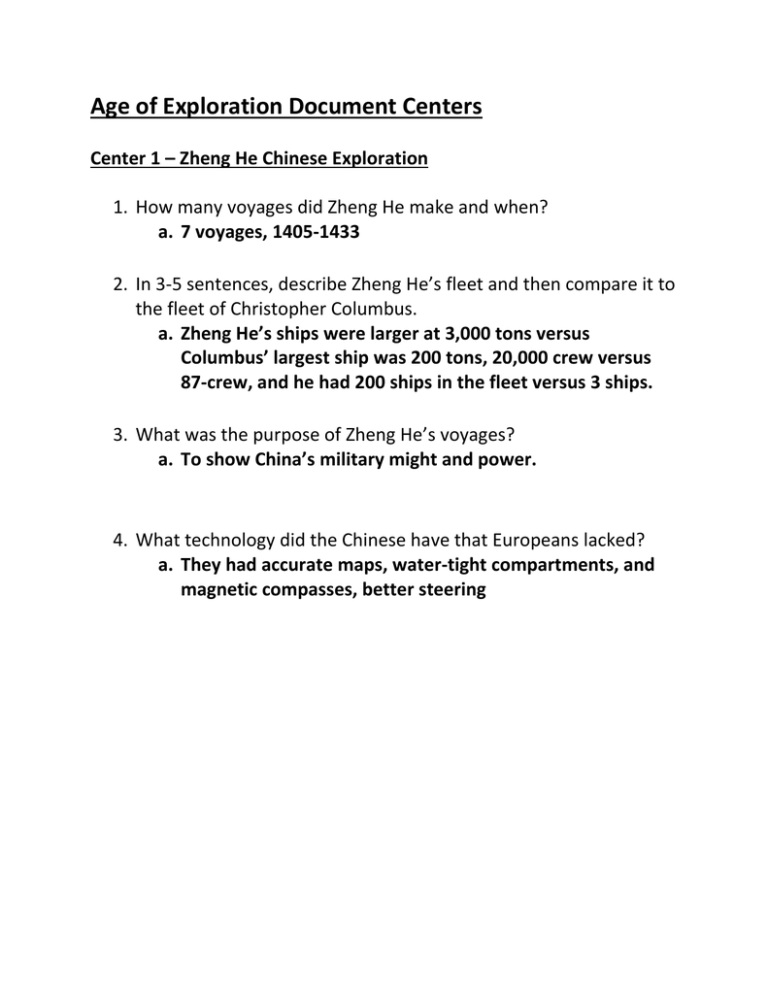
Age of Exploration Document Centers Center 1 – Zheng He Chinese Exploration 1. How many voyages did Zheng He make and when? a. 7 voyages, 1405-1433 2. In 3-5 sentences, describe Zheng He’s fleet and then compare it to the fleet of Christopher Columbus. a. Zheng He’s ships were larger at 3,000 tons versus Columbus’ largest ship was 200 tons, 20,000 crew versus 87-crew, and he had 200 ships in the fleet versus 3 ships. 3. What was the purpose of Zheng He’s voyages? a. To show China’s military might and power. 4. What technology did the Chinese have that Europeans lacked? a. They had accurate maps, water-tight compartments, and magnetic compasses, better steering Center 2 - Reasons for the Age of Exploration 1. What were some key motives for Europeans during the Age of Exploration? a. Europeans desired new trade routes to obtain resources. 2. Which motive do you think was the strongest for encouraging European exploration? Why? a. The strongest was probably the desire for resources. 3. What key advances in knowledge and technology allowed Europeans to explore these new areas? a. Prince Henry started a school and taught map-making, using astronomy, and the compass, faster ships, etc. 4. Which advance do you think was the most important? Why? a. Student Choice AND Explanation Center 3 - European Exploration and Land Claims, 1488–1610 1. Which explorer was the first to establish a sea route to Asia? For which European country did he sail? a. Vasco de Gama, Portugal 2. Which explorer was the first to sail to the east coast of South America? For which European country did he sail? a. Cabral, Portugal 3. By 1600, on which continents did Portugal claim or control territory or cities? a. South America and Africa 4. Which explorer was the first to sail to what are today the Caribbean Islands, between North and South America? For which European country did he sail? a. Christopher Columbus, Spain 5. Which explorer was the first to lead a voyage that eventually went around the world? For which European country did he sail? a. Magellan, Spain 6. Which country had explorers who led expeditions into the lands of the Aztecs and Incas in North and South America? Who were these explorers? a. Spain, Cortes and Pizarro 7. By 1600, on which continents did Spain claim territory? a. North America, South America, and Asia. 8. Which European countries during this period sent explorers to North America’s east coast? Name three of these explorers. a. France (da Verrazano), Great Britain (Cabot), Netherlands (Hudson) Center 4 - Later Spanish Exploration and Conquest 1. What contributions did each of these individuals make to later Spanish exploration and conquest? a. Hernan Cortes – explored what is now called Mexico and conquered the Aztecs (powerful and ancient indigenous civilization) b. Francisco Pizarro – explored the northern part of South America and conquered the Incas (powerful and ancient indigenous civilization) 2. What impact did later Spanish exploration and conquest have on the people of these continents? a. Europe – i. (POSITIVE IMPACT/EFFECT) – 1. colonize the Americas, 2. grow American crops such as potatoes and corn in Europe 3. enabled a population boom in Europe. ii. (NEGATIVE IMPACT/EFFECT) – Rulers of European countries spent wealth from gold and did not invest in own country, so economy dwindled b. the Americas i. (POSITIVE) – New livestock introduced to the Americas ii. (NEGATIVE) – Indigenous people such as Aztecs and Mayans died from enslavement and disease = POPULATION DECREASED Center 5 - The Impact of Exploration on European Commerce and Economies 1. Define the following terms associated with the commercial revolution in Europe: a. Capitalism – an economic (money) system based on investing money for profit. i. (Ex. Merchants trade and sell goods, pay for more voyages to buy/sell/trade, buy ownership in ship companies = own company and make profit) b. Market economy – Price of items/goods set by how much of the item/good is available (SUPPLY) and how many people want to buy it (DEMAND). c. cottage industry – People use their labor as a money value (Work to make money instead of working to provide for needs) Ex. Work as a painter instead of farming small plot of land to have just enough crops/livestock for family. d. Mercantilism – colonies provide raw materials for parent countries to process into finished goods 2. In what ways did the Age of Exploration help spur the commercial revolution in Europe? a. Age of Exploration created European colonies in New World. Ships now traded between the Old and New World. Countries manufactured raw goods, traded and sold them to make profit = THE START OF GLOBALIZATION!!!!!!!!
